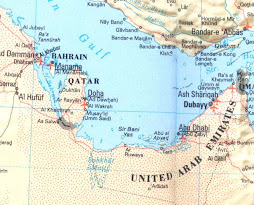On one hand, as reported by the New York Times, Saudi Arabia,
is trying to enlist other oil-producing countries to support a provocative idea: if wealthy countries reduce their oil consumption to combat global warming, they should pay compensation to oil producers.
The oil-rich kingdom has pushed this position for years in earlier climate-treaty negotiations. While it has not succeeded, its efforts have sometimes delayed or disrupted discussions. The kingdom is once again gearing up to take a hard line on the issue at international negotiations scheduled for Copenhagen in December.
The chief Saudi negotiator, Mohammad al-Sabban, described the position as a “make or break” provision for the Saudis, as nations stake out their stance before the global climate summit scheduled for the end of the year.
“Assisting us as oil-exporting countries in achieving economic diversification is very crucial for us through foreign direct investments, technology transfer, insurance and funding,” Mr. Sabban said in an e-mail message. …
Environmental advocates denounced the idea, saying the Saudi stance hampered progress to assist poor nations that are already suffering from the effect of climate change, and that genuinely need financial assistance.
“It is like the tobacco industry asking for compensation for lost revenues as a part of a settlement to address the health risks of smoking,” said Jake Schmidt, the international climate policy director at the Natural Resources Defense Council. “The worst of this racket is that they have held up progress on supporting adaptation funding for the most vulnerable for years because of this demand.
The Qatar local papers had a number of articles that show a different approach, one made possible by the large natural gas reserves controlled by Qatar as well as their heavy investment in technology (the Qatar Science and Technology Park, for one instance), here on the on the development and first use of a new jet fuel.
The national carrier made history on Monday night when its London Gatwick – Doha service became the first commercial flight to be powered by a blend of GTL kerosene and conventional crude oil-based kerosene.
“GTL Jet Fuel, a colourless liquid, contains no sulphur component at all and hence will improve air quality near airports, which are located near cities,” Brown told Gulf Times. GTL (gas to liquids) kerosene will be produced in commercial quantities by the Pearl GTL project, currently under construction by Qatar Petroleum and Shell. The project is expected to produce around 1mn tonnes of GTL kerosene yearly from 2012, enough to power a typical commercial airliner for half a billion kilometres (equivalent to carrying 250 passengers around the world 4,000 times) when used in a 50% blend to make GTL Jet Fuel.“
Qatar Science & Technology Park (QSTP) yesterday signed two agreements with its consortium partners to further quantify the benefits of Gas to Liquids (GTL) Jet Fuel, the blend of GTL kerosene and oil-derived kerosene. Texas A&M University at Qatar (TAMUQ), The University of Sheffield, Shell, Rolls-Royce and the German Aerospace Centre (DLR) are the consortium partners. “The initial research programme is for three years,” QSTP managing director Dr Eulian Roberts told Gulf Times on the sidelines of the signing ceremony.
Qatar Airways will start using GTL Jet Fuel widely from 2012, following the start-up of Pearl Gas-to-Liquids plant at Ras Laffan, airline CEO Akbar al-Baker has said. … GTL kerosene is the first aviation fuel component derived from natural gas and has obtained the required international approval and meets all the standard jet fuel specifications. It offers airlines access to an alternative feedstock to oil-based conventional fuels. This diversity of supply for the industry-gas-based rather than oil-based, will add a high quality drop-in blend component to the global jet fuel pool for many decades. … Asked whether fares would go up once GTL Jet Fuel was used to power Qatar Airways aircraft, al-Baker said: “It is true the blend is costlier than the conventional fuel. But we have no immediate plans to revise our fares on account of this.” He said the inadequate supply of GTL Jet Fuel in global markets was not a matter of concern at all. This is because the engines could fly on conventional fuel even as it is equipped to run on GTL Jet Fuel.”
See the following for complete articles from the Gulf Times:
1, 2, 3
From an article in the NYT in December 2005 we see the forecast of this success.
In a shift drawing historical comparisons to the takeoff of Saudi Arabia's oil industry several decades ago, Qatar has moved swiftly in recent years to develop its huge offshore natural gas reserves - once dismissed as practically worthless because of the difficulty of transporting gas to distant markets - while cementing strong military and economic ties with the United States.
Driven by an ambitious, well-educated and open-minded ruling elite, these moves have allowed Qatar to leap ahead of Russia and Iran, the only countries with larger reserves of natural gas, seizing new opportunities to export the fuel to markets in North America, Southern Europe and the Far East.
Tankers laden with gas super-cooled to a liquid state already depart each day for Japan and South Korea from the northern port of Ras Laffan, not far from Al Udeid Air Base in the Qatari desert, the U.S. military's main air operations center in the Arabian Peninsula. Soon the ships will start delivering their cargoes to ports in Texas and Louisiana in the most ambitious project to date to bring natural gas from the Middle East to American consumers.
Andrew Brown, Royal Dutch Shell's country manager in Qatar, said that greater natural gas and oil production should result in overall daily energy production equivalent to about five million barrels of oil a day by 2012, nearly half the daily oil output of Saudi Arabia.
"Over the next five years," Brown said, "Qatar is going to see an energy boom as significant as any other in the past."



